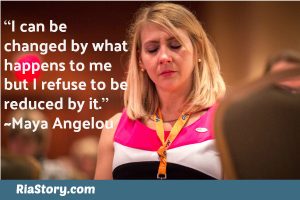Christmas has always been my favorite time of year. It’s not the presents, or the food, or the lights, but rather it’s the fact that so many people are a little nicer, a little more giving, and a little more thankful. I saw a homeless man standing at the corner of a parking lot yesterday. “Anything helps,” his sign read. I watched as a man pulled over and gave him some money. Usually, people just drive on by and pretend not to notice. At Christmas, our perspective changes. It’s the “season of giving” and we focus more on being grateful and gracious. At least until the line in the grocery store stops moving because someone needs a price check or the waitress gets the order wrong at the restaurant.
But, as much as I love Christmas, holidays always come with a little sadness for me. There are many memories of Christmas holidays from the past when I wasn’t happy. Like the Christmas that came a few days after I had tried to run away from home and ended up right back where I started, pretending desperately to myself and everyone else that things were just fine. They weren’t. I was depressed and desperate, feeling alone, lost, and hopeless.
“Whoever was still alive had reason for hope.” Viktor Frankl
Life sometimes seems hopeless – but it isn’t. The fact that we have life and there is a reason for life, a meaning for life, means that it isn’t hopeless, but that we need to see a different perspective. In “Man’s Search for Meaning,” concentration camp survivor Viktor Frankl speaks of a time when he was asked to encourage his fellow prisoners. They were starving, freezing, and dying due to the horrible circumstances of their captivity. Many had watched their loved ones be sent to the gas chambers. They were sick, wearing rags, and literally being worked to death. When one prisoner “stole” some potatoes, the entire 2,500 man unit chose to take the punishment of starving for a day rather than turn in the “thief.” Frankl was asked to encourage them in their despair:
“God knows, I was not in the mood to give psychological explanations or to preach any sermons – to offer my comrades a kind of medical care of their souls. I was cold and hungry, tired and irritable, but I had to make the effort….Encouragement was now more necessary than ever. So I began by mentioning the most trivial of comforts first…..I said that our situation was not the most terrible we could think of….whoever was still alive had reason for hope….And I quoted from Nietzche ‘That which does not kill me, makes me stronger.’…Then I spoke about the future. I said that to the impartial, the future must seem hopeless…I agreed that each of us could guess for himself how small were his chances of survival….I estimated my own chances at about one in twenty. But I also told them that, in spite of this, I had no intention of losing hope and giving up. For no man knew what the future would bring, much less the next hour….Then I spoke of giving life meaning…I told my comrades that human life never ceases to have a meaning…they must not lose hope but should keep their courage in the certainty that the hopelessness of our struggle did not detract from its dignity and it’s meaning.”
“Hope is being able to see that there is light despite all of the darkness.” Desmond Tutu
Frankl’s words resonate with me even today, “Our situation was not the most terrible we could think of.” That’s a powerful statement because there aren’t many situations I could think of that are worse than what he was going through. It puts things into perspective for me. My own personal past seemed like an awful nightmare that I couldn’t wake up from. It’s a dark part of my life that I would rather have buried forever rather than talk about it, much less write a book about it. And yet, it’s insignificant when compared to what Frankl experienced and how he demonstrated the power of choosing one’s perspective. He realized that he always had the ability to choose his perspective and his attitude and no one could take that away from him.
Perspective: A mental view or prospect
Life won’t always happen like we want. There will be tough times, hard times, and painful times. You will lose your car keys, get sick, have a flat tire, or lose your luggage (or the airline will). You might be broke, have a terminal illness, or have lost a loved one. You might be spending Christmas without your parents this year, like I am and have for the last 15 years. Not because they have passed away but because I chose to leave.
I left home at 19 to escape being sexually abused by my father. It started when I was 12. There were times when life seemed like it wasn’t worth living.
I had a perspective of hopelessness.
But, today, I choose a perspective of hope. We don’t get to decide what happens to us each day. I didn’t choose what happened to me. Viktor Frankl didn’t choose what happened to him. We don’t always get to choose. But, we always have the ability to look at our situation with a perspective of hope and the perspective that things aren’t as bad as they could be. They are as bad as we choose to let them be.
Ria is a motivational speaker and certified executive coach with a passion for asking questions to empower others to make the right choices today to reach their goals tomorrow. Contact Ria for more information on her coaching programs. To sign up for Ria’s complimentary leadership training series, CLICK HERE.

